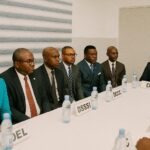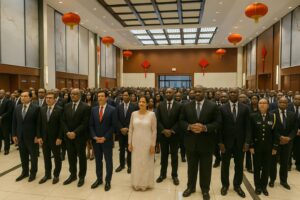A Reverberation of Faith and Statecraft
Few diplomatic dispatches blend spiritual symbolism and geopolitical calculation as deftly as a papal missive. On 29 July in Brazzaville, Apostolic Nuncio Javier Herrera-Corona crossed the courtyard of the Palais du Peuple to hand President Denis Sassou Nguesso a personal letter from Pope Francis, the successor of Saint Peter whose soft-power reach spans 186 accredited missions (Annuario Pontificio 2023). The brief ceremony, discreetly choreographed yet rich in liturgical gravitas, reaffirmed the Holy See’s intent to remain an active stakeholder in the Congolese public sphere.
Brazzaville’s Red Carpet for the Papal Envoy
According to the Congolese Presidency’s communique, the head of state and the nuncio held “a conversation marked by cordiality and mutual trust”. Observers noted the absence of contentious rhetoric: Archbishop Herrera-Corona emphasised the Catholic Church’s readiness “to serve harmony, peace and development in the Congo”, while President Sassou Nguesso—himself educated at the Catholic Mission of Edou—hailed the Church as a catalyst for human capital. The Vatican diplomat, who previously represented the Holy See in West Africa, knows the subtle art of pastoral diplomacy; his presence signalled Rome’s confidence in Brazzaville’s stability at a moment of regional fluidity (Vatican News, 30 July 2023).
A Bilateral Tapestry Woven since 1967
Vatican-Congo relations date from 6 February 1967, barely seven years after independence, when the two entities exchanged their first envoys. The rapport survived ideological swings in the 1970s and matured after Congo’s 1992 National Conference restored multi-party politics. A pivotal milestone was the Framework Agreement signed on 3 February 2017 in Brazzaville, which granted the Church juridical personality and guaranteed freedom for its institutions to operate in education, health and charity (Osservatore Romano, 4 Feb 2017). That text, ratified unanimously by the Congolese Parliament, still serves as the legal backbone for contemporary cooperation, ensuring predictability for both chancery and cathedral.
Education and Health: Cornerstones of Concord
Roughly 30 % of Congo’s primary-school pupils attend Catholic-affiliated institutions, whose reputation for academic rigor attracts families beyond the Church’s own faithful (Ministry of Primary Education, 2022). In the health sector, the Catholic network administers 18 hospitals and 64 dispensaries, many in remote districts where public facilities are scarce. By leveraging catechetical infrastructure, the state has found an ally for outreach campaigns ranging from malaria prevention to the recent COVID-19 vaccination drive. Economists at the University of Marien-Ngouabi estimate that Church-run services save the public budget nearly two percent of GDP annually through shared social expenditure.
Religion as a Vector for Peace and Development
The Holy See traditionally deploys moral authority rather than material leverage. In 2014 the Episcopal Conference mediated local cease-fires in the Pool region; in 2022 it launched an interfaith dialogue on climate resilience along the Congo Basin, complementing President Sassou Nguesso’s decade-long advocacy for the “Blue Fund” devoted to forest conservation (UNEP report 2022). Herrera-Corona’s message reiterated “the Pope’s spiritual closeness to those working for reconciliation”. Although Brazzaville currently enjoys relative calm, the memory of past turbulence renders such assurances symbolically potent.
Quiet Diplomacy amid Regional Flux
Congo-Brazzaville occupies a strategic niche bordered by the vast Democratic Republic of the Congo, oil-rich Angola and the restive Central African Republic. In this ecosystem the Holy See acts as an informal sounding board for conflict-prevention initiatives, while the Congolese government values the Vatican’s access to global forums from the African Union to COP summits. Analysts in Rome speak of a “diplomacy of the peripheries”, whereby the Pope highlights theatres that seldom headline great-power agendas. By receiving the nuncio with presidential honours, Brazzaville signalled both gratitude and an openness to multilateral engagement unencumbered by zero-sum logic.
Prospects under a Benevolent Gaze
If symbolism constitutes the currency of ecclesiastical diplomacy, then the exchange on 29 July has injected fresh liquidity into an already resilient partnership. Upcoming priorities include the expansion of vocational institutes in Oyo and Pointe-Noire, the digitisation of diocesan medical records and a joint forum on ecological education scheduled for early 2024. None of these ventures promises instant headlines; yet, in the measured cadence of Holy See diplomacy, incremental gains often yield durable dividends. As Brazzaville charts its development trajectory, the Pope’s letter operates less as a policy directive than as a gentle nudge: an encouragement to harmonise temporal governance with the ethical imperatives that, for many Congolese citizens, remain inscribed in both faith and daily life.




















